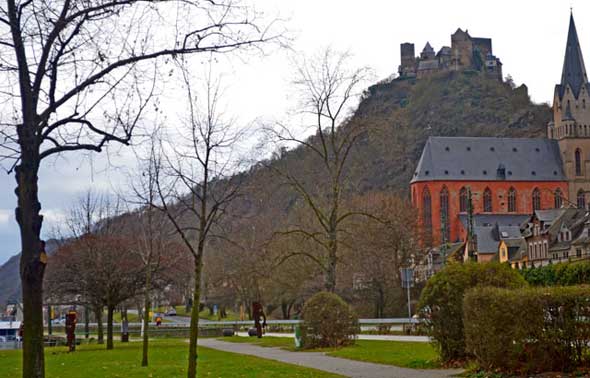story and photo by Brenden Robbeloth
The 40-mile stretch of the Rhine River between Bingen am Rhein and Koblenz has been called the “Romantic Rhine.” For centuries, artists, poets and writers have been drawn to the small villages along the banks of the river as a source of tranquility and inspiration. There are dozens of small villages in just that short stretch, and nearly 30 castles and fortresses dot the local hilltops.
Narrow roads run the length of the journey along both sides of the river. They pass through the villages, along the riverfront parks and through tunnels carved into the mountain sides.
The steep slopes of the hills, which are part of the Rhenish Massif, have been terraced for vineyards, almost as if to direct the eyes up to the ruined compounds sitting atop those ancient hills.
Many of the villages still have the remnants of their historic fortified walls in place, a testament to the brutal history of the area. The land has changed hands many times over the centuries, and the result is that most of the castles and fortresses are only ruins, remnants of their once great structures. However, many have undergone extensive reconstructions over the centuries and now serve as hotels. Even more of them offer tours of the grounds.
River cruises are a popular way to experience the beauty of the romantic Rhine Valley, but only by driving along the winding roads and spending time in the villages, sitting at outdoor cafes and walking along the riverfront parks can one put the experience in one’s own hands.
The towns of Bacharach, Oberwesel and St. Goar are the most popular villages along the way to Koblenz, but for good reason. In Bacharach, one can walk along the river trail and for only a couple euros, take a ferry out to the Castle Pfalz, built on an island in the middle of the river, once used for collecting tolls from river traffic. Stahleck Castle sits up on the hills overlooking the town, and is definitely worth seeing, if only to spend the entire time wondering how anyone can build a moat on top of a hill.
St. Goar is the place to eat. The Hotel Restaurant am Markt has excellent authentic German cuisine and an outdoor terrace with beautiful views of the historic town and surrounding valley.
Across the river, the Castles Katz and Maus seem to stare each other down, in true Tom and Jerry fashion, over the town of Lorely.
After lunch, head back along the river road, but be sure to stop by St. Goar again on the way home because Alla Fontana, a small Italian restaurant with great food, friendly service and very reasonable prices, is another must.
If one can pry themselves away from the charm of the villages, they will eventually come to Koblenz, where the great Rhine meets the Moselle River.
Koblenz is a city built up due to its strategic location at the conjunction of the two rivers, and it is a beautiful sight to see from the cable car rides over the Rhine, up to Ehrenbreitstein Fortress.
Plan on getting to Koblenz early enough in the day for shopping and snacking at the outdoor cafes of the historic downtown square and the German Corner.
Or, better yet, stay the night in one of the reconstructed castles or famous bed and breakfasts in St. Goar and Boppard and spend day two in Koblenz. A single day is a small window to absorb so much history and scenery.
Next:
How about a longer road trip? Check out the German Alpine Road.
Or take a trip to Luxembourg! A fairly short drive, but a whole different country!
